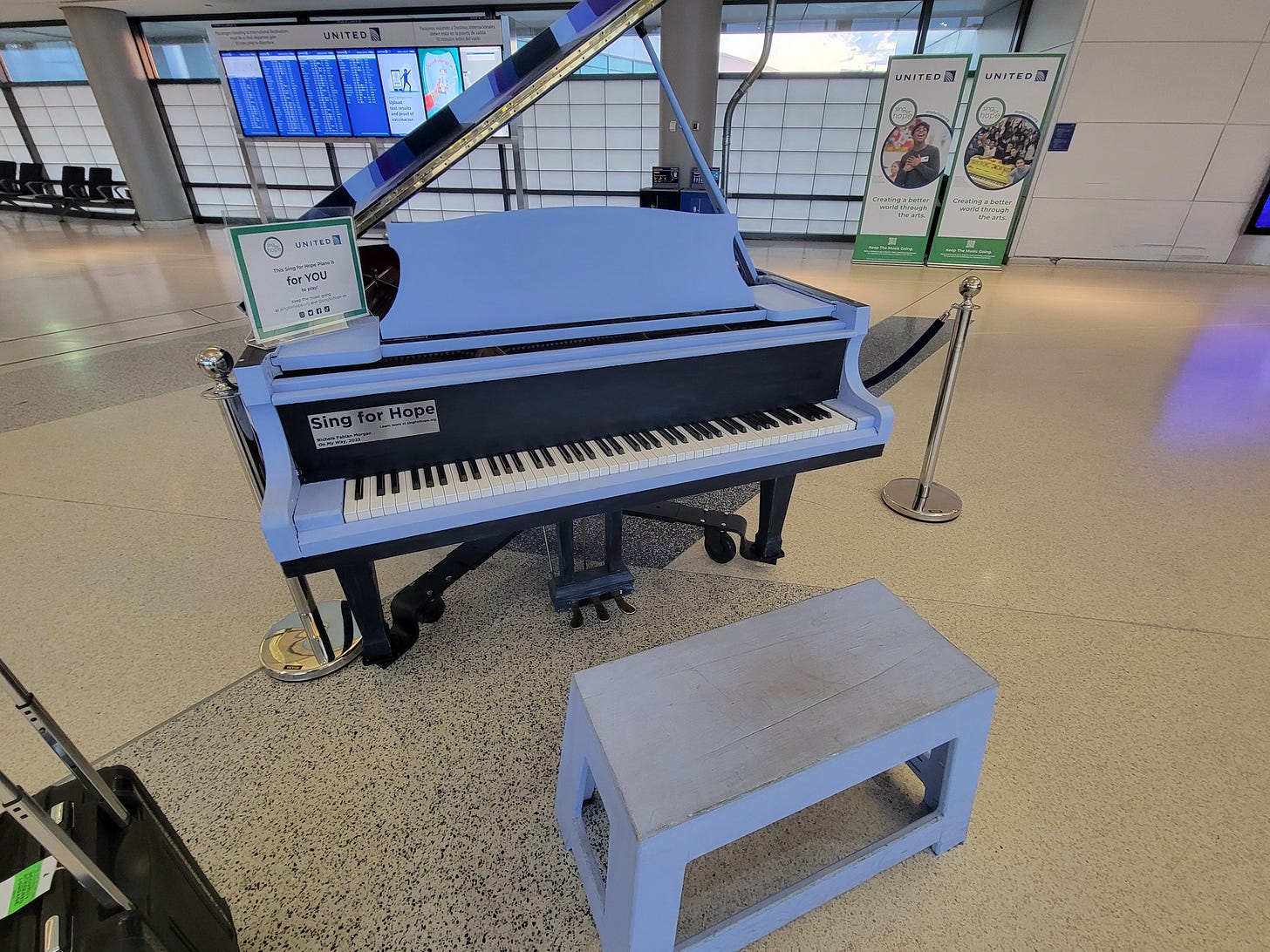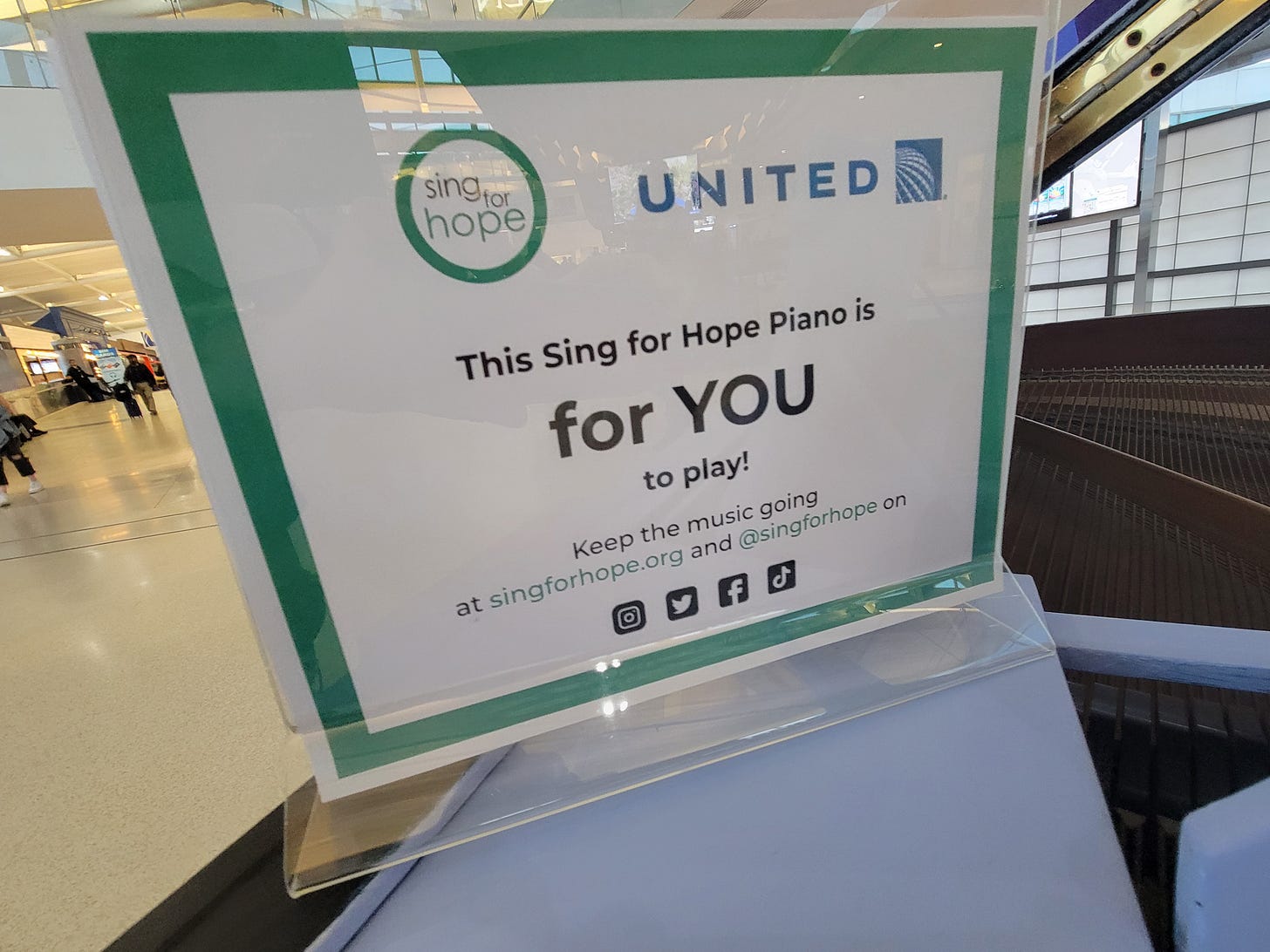Embrace the Oasis
A layover in Newark, a few minutes to spare and a beckoning piano
What’s your oasis in the desert? What helps get you through the struggle and strife and stress of your days?
For me, prayer is a great reminder of God’s promises and my own earthly limitations. Activity that blends the physical and mental is another great outlet: I frequently describe my free-throw shooting excursions as my version of yoga.
Then there are those impromptu opportunities that come my way. A few weeks ago, amid a long travel day and a tight layover at Newark Liberty International Airport, this manifested as a piano. It beckoned, playfully colored somewhere in the blue-purple palette.
I did a double take, moved closer, and saw this Sing for Hope1 sign:
I had a decision to make. Would I trudge onward to Gate C81, where another sold-out airplane awaited me? Or linger for a sip from this unexpected oasis? I glanced at my watch, saw that I had a few minutes to spare, and enlisted an airport employee to play videographer:
If you’re over 50 years old, there’s a very good chance you recognize the tune: these are the opening notes of “Those Were the Days,” the theme song for Norman Lear’s hit 1970s show, All in the Family.
How did I learn the ditty— and why is it the only one that I ever learned, if only partly? My memory on that front is vague, as is how our family inherited the rather well-worn piano on which I played the tune sporadically throughout my childhood. Every time I play it, I can hear the voices of All in the Family co-stars Carroll O’Connor2 (as the boorish, blunt and bigoted Archie Bunker) and Jean Stapleton in the role of his sweet, eternally patient wife, Edith.
Compare my version to the TV show’s opening, which Geoff Williams thoroughly and wonderfully explores on his website, The TV Professor:
My `Those Were the Days’ Debut
My impromptu New Jersey moment wasn’t the first public display of my highly limited piano repertoire. That came on June 17, 1994, during an Investigative Reporters & Editors Conference.
To set the scene: I was part of a horde of journalists who had assembled at the St. Louis Union Station Hotel bar. On the television was Game 5 of the NBA Finals that pitted the New York Knicks against the Houston Rockets. Suddenly, the action shifted from jump shots and rebounds to a drama playing out in California: the surreal slow-speed chase of football-and-broadcasting star-turned-murder suspect O.J. Simpson.
In the middle of a few beers and in the midst of getting trained to become better journalistic watchdogs, this TV-centric chapter of American criminal history was unfolding before our eyes. As these layers of surrealness commingled, I made my way to the unoccupied piano at the edge of the bar.
Over and over, I tickled the ivories with the opening chords of “Those Were the Days.” In contrast to Billy Joel’s “Piano Man”3 protagonist, nobody put bread in my jar. But then again, nobody dragged me away. I stopped after a few minutes, content that I had done my part in a scene that avant-garde director David Lynch could have whipped up.
Over the past three decades, I have reprised my part-of-one-song catalogue at every chance, most often in hotel lobbies. Every time, it’s an opportunity to go back to that playroom basement of my childhood — and to carve out a little oasis in my day.
If you have enjoyed reading this and any other installments of The Inside Edge, please click on the “like” button, leave a comment or share this with others who might also enjoy it.
From the Sing For Hope “About” page:
Sing for Hope harnesses the power of the arts to create a better world. Our creative programs bring hope, healing, and connection to millions of people in hospitals, care facilities, schools, refugee camps, transit hubs, and community spaces worldwide. Sing for Hope partners with hundreds of community-based organizations, mobilizes thousands of artists in creative service, and produces artist-created Sing for Hope Pianos across the US and around the world.
In a cool twist, on July 12, 1999, along with my wife, I acted in a movie scene with Carroll O’Connor. The movie, Return to Me, came out the following year. You can read about it here.
Can you believe this is the 50th anniversary of “Piano Man”? It was recorded in September 1973, and released by Columbia Records on November 9th. You can win a bar bet with those details.




Thanks for "The TV Professor" shout-out! :)